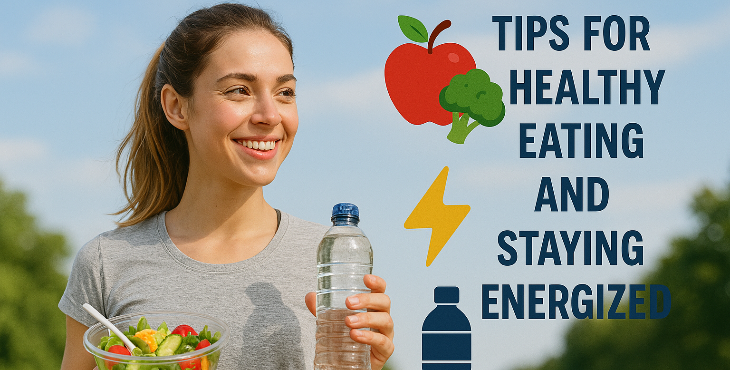
- May 02, 2025
Tips for Healthy Eating and Staying Energized
Between school, work, sports, and social life, it’s easy to let your energy levels crash. But here’s the truth: what you eat (and how often you eat it) has a huge impact on how you feel throughout the day. Building healthy eating habits doesn’t have to be complicated—it’s all about balance, smart choices, and listening to your body.
Here are some practical tips to keep your energy up and your body fueled the right way:
1. Don’t Skip Breakfast
Breakfast jump-starts your metabolism and helps you focus during the day. Try a combo of protein, fiber, and healthy fats for long-lasting energy. Some ideas:
- Greek yogurt with fruit and granola
- Peanut butter on whole grain toast
- Eggs with avocado and a side of fruit
- A smoothie with spinach, banana, and protein powder
Even if you're in a rush, grab something quick like a granola bar or a banana—something is better than nothing.
2. Snack Smart
Snacks can keep your energy steady—if you choose wisely. Instead of reaching for sugary snacks that cause a quick spike (and crash), try:
- Apple slices with peanut butter
- Trail mix with nuts and dried fruit
- String cheese and whole grain crackers
- Veggies with hummus
Aim for snacks that have a mix of protein and carbs to keep you satisfied and fueled.
3. Stay Hydrated
Dehydration = fatigue. Sometimes when you feel tired or hungry, you’re actually just thirsty. Try to drink water throughout the day, even if you’re not super thirsty. Carry a water bottle with you and aim for about 6–8 cups a day (more if you’re active).
Add lemon, cucumber, or a splash of juice to make it more interesting if plain water gets boring.
4. Choose Whole Foods
The more natural your food is, the better it is for your body and energy levels. Stick with:
- Whole grains (brown rice, oats, whole wheat bread)
- Lean proteins (chicken, fish, tofu, beans)
- Fresh fruits and vegetables
- Healthy fats (nuts, seeds, olive oil, avocado)
Try to limit processed foods, which often contain added sugar, salt, and unhealthy fats that can weigh you down.
5. Eat Regularly
Waiting too long between meals can leave you feeling tired, cranky, and unfocused. Aim to eat every 3–4 hours to keep your blood sugar stable and your energy up. That means three balanced meals and a couple of healthy snacks in between.
6. Limit Energy Drinks and Sugary Drinks
While soda or energy drinks might give you a temporary boost, they usually come with a crash. Try cutting back on these and opt for water, herbal tea, or natural fruit juice instead. If you drink coffee, don’t overdo it—too much caffeine can mess with your sleep and energy levels.
7. Plan Ahead
If you’re always on the go, having healthy food available can be a lifesaver. Pack snacks in your backpack, prep meals ahead of time, and try not to rely on vending machines or fast food. A little planning goes a long way.
8. Listen to Your Body
Everyone’s needs are different. If you’re tired all the time, moody, or getting frequent headaches, it could be a sign you’re not eating enough or not eating the right things. Pay attention to how food makes you feel, and adjust as needed.
Final Thoughts
Healthy eating isn't about being perfect or dieting—it's about giving your body the fuel it needs to feel good, stay focused, and have the energy to do what you love. Start small, make simple changes, and build habits that support your goals.
Eat well, feel well, and keep going strong. You’ve got this.


